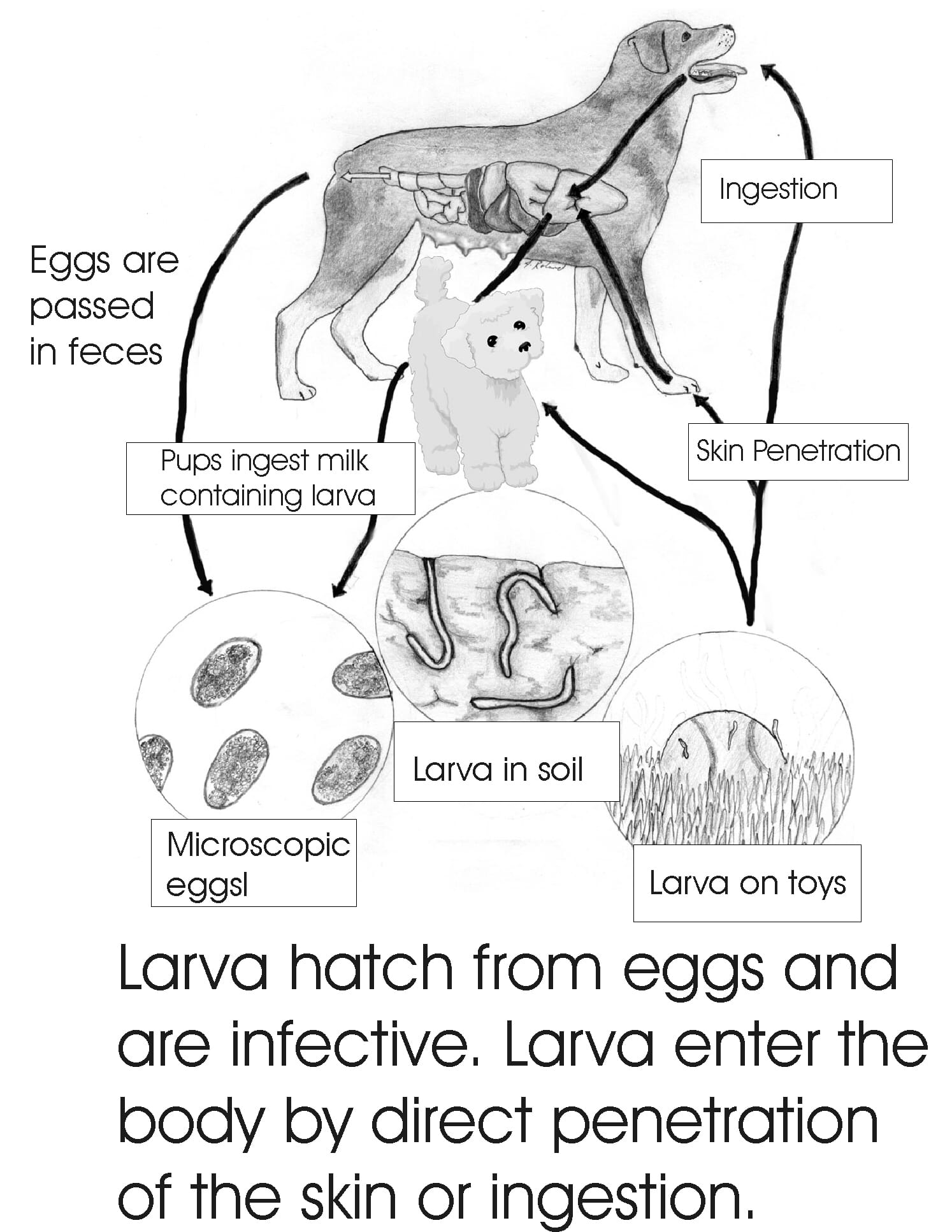The profound bond between pet owners and their dogs often blurs the lines between family members and companions. This deep connection extends to sharing our lives, homes, and even, sometimes unintentionally, parasites. A common concern among dog owners is the question: “Can humans get worms from dogs?” This is a valid concern that requires a thorough understanding to ensure the well-being of both pets and their human families. At Boulder Veterinary Hospital in Boulder, CO, we are dedicated to equipping pet owners with essential information to safeguard their health and that of their cherished animals. For professional guidance or to address any concerns, please contact us at (303) 442-6262 or schedule an appointment online.
Understanding Worm Transmission from Dogs to Humans
Parasites, including various types of worms, can indeed transfer from animals to humans through several pathways. Recognizing these transmission routes is the fundamental step in effective prevention.
Direct Contact with Contaminated Feces and Soil
One of the primary methods for humans to contract worms from dogs involves direct contact with feces or soil contaminated with parasite eggs or larvae. When a dog harbors intestinal worms, these microscopic stages are often shed in their stool. If a person, particularly a child who may be less diligent with hygiene, comes into contact with this contaminated material and subsequently touches their mouth or food, transmission can occur. This highlights the importance of immediate cleanup of pet waste and thorough handwashing.
Ingestion of Contaminated Food or Water
Worm eggs can contaminate water sources or food items if they come into contact with infected feces or soil. Consuming food or water that has been compromised in this way can lead to the ingestion of parasite eggs, initiating an infection in humans. Maintaining a clean environment and ensuring food and water sources are protected from contamination are critical preventive measures.
Common Worms Transmissible from Dogs to Humans
Several types of intestinal parasites found in dogs can pose a risk to human health. Understanding these common culprits is vital for early detection and effective prevention strategies.
Roundworms (Toxocara canis)
Roundworms are among the most frequently transmitted parasites from dogs to humans. In humans, these larvae can migrate through the body, a condition known as visceral larva migrans. This migration can potentially affect various organs, including the liver, lungs, and eyes, leading to significant health complications if left untreated.
Hookworms (Ancylostoma caninum, Uncinaria stenocephala)
Hookworms present another significant transmission risk, causing cutaneous larva migrans in humans. This condition manifests as intensely itchy, red, raised tracks on the skin, marking the path of the migrating larvae. While generally superficial, hookworm infections can cause discomfort and secondary skin infections if not managed.
Tapeworms (Dipylidium caninum)
Although less common than roundworm or hookworm transmission, certain tapeworm species can be passed from dogs to humans. The most frequent route for this is the accidental ingestion of an infected flea. Fleas act as intermediate hosts for tapeworm larvae, and if a dog or human ingests an infected flea, the tapeworm can develop. This underscores the importance of flea control for both pets and the home environment.
Essential Prevention Strategies for Pet Owners
Protecting your family and pets from worm transmission requires a multi-faceted approach, integrating diligent personal hygiene, consistent pet healthcare, and effective environmental management. Implementing these actionable tips can significantly mitigate the risk.
Prioritize Regular Veterinary Visits and Deworming
Ensuring your dog receives regular veterinary check-ups and adheres to a consistent deworming schedule is paramount. Best way to treat worms in dogs often involves a veterinarian’s guidance on appropriate medications and frequency. Boulder Veterinary Hospital provides thorough examinations and can recommend the most suitable deworming protocol tailored to your dog’s specific needs and lifestyle.
Maintain Rigorous Personal Hygiene Practices
Washing hands thoroughly and frequently is a cornerstone of preventing parasite transmission. This is especially critical after interacting with your dog, handling their waste, or engaging in activities like gardening where contact with contaminated soil is possible. Educating children about the importance of handwashing can further reduce transmission risks. Practicing good hygiene is a simple yet powerful defense.
Ensure Environmental Cleanliness
Prompt and proper disposal of pet waste is essential to prevent the spread of parasite eggs. Maintaining a clean living environment for both your pets and your family helps minimize the potential for worm eggs to contaminate your home and yard. Regular cleaning of pet bedding and living areas further contributes to a healthier environment. You can explore best all in one flea and worm treatment for dogs to manage multiple parasite concerns.
Recognizing When to Seek Veterinary Care
If you suspect your dog may be suffering from a worm infestation, it is crucial to seek professional veterinary attention without delay. Key indicators of worms in dogs can include the visible presence of worms in their stool, unexplained weight loss, a distended or bloated abdomen, lethargy, and noticeable changes in appetite. At Boulder Veterinary Hospital, our team is equipped to provide expert diagnosis, treatment, and preventative advice for worm infestations in your pets. Protecting your family’s health begins with ensuring the robust health of your pets. If you have any concerns or need to book an appointment, please call us at (303) 442-6262 or use our online booking system. Addressing potential parasite issues promptly is key to a healthy home for everyone.

